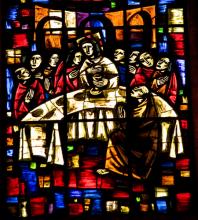divisions

Whenever dialogue about the fate of faith surfaces, which seems like always (and perhaps it’s been this way since disciples first broke bread together), the church gets hit the hardest. The “relationship-not-religion” rap remains popular on the right, the left loves to loathe abuses of ecclesial authority, and so on; thus the internal bickering multiplies like so many loaves and fishes.
When my denominational family, the Presbyterian Church USA (PCUSA), decided against sanctioning gay marriage at its recent General Assembly, I expressed support for the defeated measure on my Facebook page and reposted a blog that denounced some of the more bigoted remarks from the assembly’s discussion floor. An old friend who participates in a Unitarian Universalist congregation read my post and replied, suggesting that I might be “going too easy on the church,” perchance because my comments accompanying the reposting were not harsher and more dramatic in my critique of what many view as religiously motivated homophobia.
This phrase and image of “going easy on the church” stuck in my mind because the church has been quite easy for me — inviting me, a confessed sinner, into its doors and into its community, after years of walking on the slippery slopes and loose living of the wild side.
In my experience, the church has not just been easy on reformed sinners, it has been easy on the poor, the lonely, the recovering addicts, the very young, and the very old. The church makes life easier for a lot of people, with its marrying and mourning, peacemaking and potlucks, prayer groups and parenting classes, rummage sales and support for refugees, disaster relief and radical discipleship.